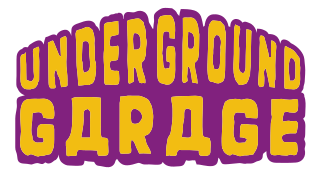
Garage Inc. is a compilation album of cover songs by American heavy metal band Metallica. It was released on November 24, 1998, through Elektra Records. Over 2.5 million copies have been sold in the U.S. as certified by the RIAA. It includes cover songs, B-side covers, and The $5.98 E.P.: Garage Days Re-Revisited, which had gone out of print since its original release in 1987. The title is a combination of Garage Days Revisited and their song "Damage, Inc.", from Master of Puppets, and the album's graphical cover draws heavily from the 1987 EP. The album features songs by artists that have influenced Metallica, including many bands from the new wave of British heavy metal movement, hardcore punk bands and popular songs. As of August 2013, the album has sold more than 6 million copies worldwide. It marks the last album to feature bassist Jason Newsted who would quit the band three years later in 2001.
Punk rock is a rock music genre that developed in the mid-1970s in the United States, United Kingdom, and Australia. Rooted in 1960s garage rock and other forms of what is now known as "proto-punk" music, punk rock bands rejected perceived excesses of mainstream 1970s rock. They typically produced short, fast-paced songs with hard-edged melodies and singing styles, stripped-down instrumentation, and often political, anti-establishment lyrics. Punk embraces a DIY ethic; many bands self-produce recordings and distribute them through independent record labels and other informal channels.
Rock music is a broad genre of popular music that originated as "rock and roll" in the United States in the early 1950s, and developed into a range of different styles in the 1960s and later, particularly in the United Kingdom and in the United States. It has its roots in 1940s and 1950s rock and roll, a style which drew heavily on the genres of blues, rhythm and blues, and from country music. Rock music also drew strongly on a number of other genres such as electric blues and folk, and incorporated influences from jazz, classical and other musical styles. Musically, rock has centered on the electric guitar, usually as part of a rock group with electric bass, drums, and one or more singers. Usually, rock is song-based music usually with a 4/4 time signature using a verse–chorus form, but the genre has become extremely diverse. Like pop music, lyrics often stress romantic love but also address a wide variety of other themes that are frequently social or political.
Hip house, also known as rap house or house rap, is a musical genre that mixes elements of house music and hip hop. The style rose to prominence during the late 1980s in Chicago and New York. Originating in Chicago and in the United Kingdom, the style quickly became popular with tracks like "Rok da House" by English electronic group the Beatmasters featuring British female MCs the Cookie Crew.

Steven Van Zandt is an American musician and actor, who frequently goes by the stage names Little Steven or Miami Steve. He is a member of Bruce Springsteen's E Street Band, in which he plays guitar and mandolin. He is also known for his roles on television dramas such as Silvio Dante on The Sopranos (1999–2007) and Frank Tagliano / Giovanni "Johnny" Henriksen on Lilyhammer (2012–2014). Van Zandt also has had his own solo band called Little Steven and The Disciples of Soul, active on and off since the 1980s. In 2014, Van Zandt was inducted into the Rock and Roll Hall of Fame as a member of the E Street Band.

Joe's Garage is a three-part rock opera recorded by American musician Frank Zappa in September and November 1979. Originally released as two separate studio albums on Zappa Records, the project was later remastered and reissued as a triple album box set, Joe's Garage, Acts I, II & III, in 1987. The LPs initially received mixed to positive reviews, with critics praising its innovative and original music, but criticizing the scatological, sexual and profane nature of the lyrics. Since its original release, Joe's Garage has been reappraised in a better light by some critics.

GarageBand is a line of digital audio workstations for macOS and iOS devices that allows users to create music or podcasts. GarageBand is developed and sold by Apple for macOS, and is part of the iLife software suite. Its music and podcast creation system enables users to create multiple tracks with pre-made MIDI keyboards, pre-made loops, an array of various instrumental effects, and voice recordings.
Acid rock is a loosely defined type of rock music that evolved out of the mid-1960s garage punk movement and helped launch the psychedelic subculture. The style is generally defined by heavy, distorted guitars, lyrics with drug references, and long improvised jams. Its distinctions from other genres can be tenuous, as much of the style overlaps with '60s punk, proto-metal, and early heavy, blues-based hard rock.
Proto-punk is the rock music played by garage bands from the 1960s to mid-1970s that presaged the punk rock movement. The phrase is a retrospective label; the musicians involved were generally not originally associated with each other, and came from a variety of backgrounds and styles, but together they anticipated many of punk's musical and thematic attributes.

Punk blues is a rock music genre that mixes elements of punk rock and blues. Punk blues musicians and bands usually incorporate elements of related styles, such as protopunk and blues rock. Its origins lie strongly within the garage rock sound of the 1960s and 1970s.
Post-punk revival is a genre of indie rock that developed in the late 1990s and early 2000s, inspired by the original sounds and aesthetics of garage rock of the 1960s and new wave and post-punk of the 1980s. Bands that broke through to the mainstream from local scenes across the world in the early 2000s included the Strokes, the Killers, Franz Ferdinand, The Kooks, Interpol, Bloc Party, Arctic Monkeys and Kaiser Chiefs who were followed to commercial success by many established and new acts. By the end of the decade, most of the bands had broken up, moved on to other projects or were on hiatus, although some bands returned to recording and touring in the 2010s.

Underground Garage is the name shared by two related but different radio outlets, a syndicated show and a satellite radio station, both created and supervised by Bruce Springsteen & The E Street Band guitarist Steven Van Zandt to present rock 'n' roll and garage rock on radio. Both outlets play a mixture of garage rock both old and new, and the music which influenced today's garage rock. On both the Sirius XM channel and on the syndicated show, one song is regularly proclaimed as "The Coolest Song in the World This Week."

Pebbles is an extensive series of compilation albums in both LP and CD formats that have been issued on several record labels, though mostly by AIP. Together with the companion Highs in the Mid-Sixties series, the Pebbles series made available over 800 obscure, mostly American "Original Punk Rock" songs recorded in the mid-1960s — primarily known today as the garage rock and psychedelic rock genres — that were previously known only to a handful of collectors. In 2007, the release of the Pebbles, Volume 11: Northern California CD marked the final album in the Pebbles series. The following year, Bomp! marked the 30th anniversary of the original Pebbles album with a spartan, limited-edition, clear-vinyl reissue complete with the original pink cover insert.
Garage punk is a rock music fusion genre combining the influences of garage rock, punk rock, and other forms, that took shape in the indie rock underground between the late 1980s and early 1990s. Bands drew heavily from stripped-down 1970s punk rock and Detroit proto-punk, and incorporated numerous other styles into their approach, such as power pop, 1960s girl groups and garage rock, hardcore punk, early blues and R&B, and surf rock.






